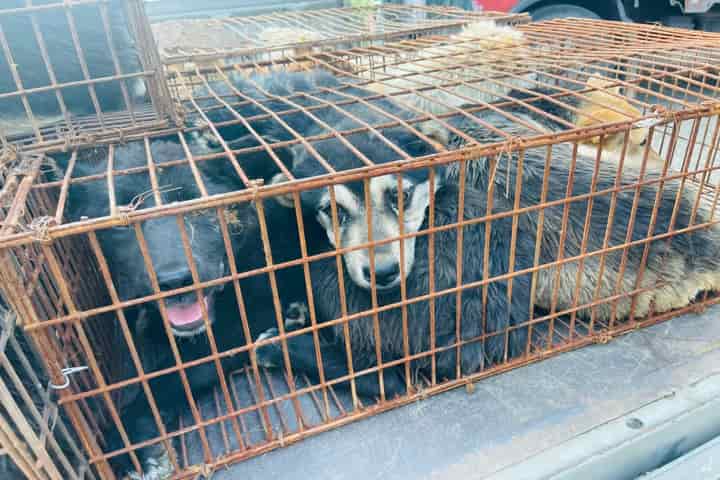The summer solstice on June 21 marking an important global climate event portents bad times for dogs in China as the notorious 10-day dog meat festival in the country’s Yulin city begins there, resulting in slaughter of millions of canines. However, animal activists in China every year, make an effort in their own way to curb it, without much support from the authorities.
The Yulin dog meat eating festival is also known as Jinhua Hutou Dog Meat Festival.
In a recent report in the South China Morning Post it was stated that the animal activists in a southern Chinese city intercepted a truck last week. Why? Because it was crammed with 68 dogs in rusty wired cages, all heading for slaughter and to be served during the dog meat festival.
The sources in Humane Society International (HSI), informed that the truck was intercepted outside Yulin city in the Guangxi autonomous region. Several of these animals were reported to be in poor health and interestingly, many offered their paws to the activists, a behaviour that suggests that they were stolen pets.
The reason why this action was undertaken by the activists was revealed by a Guangxi animal welfare activist who wished to remain anonymous who said that they had hoped the authorities would confiscate the dogs on their arrival in Yulin, but decided to save the dogs themselves when there was no action.
BREAKING YULIN RESCUE 🚨: 68 dogs destined for slaughter have been rescued in China .Many are starving, dehydrated and in desperate need of veterinary treatment.
Please, make a donation to support immediate care for the dogs & protect all animals: https://t.co/4Mx0bCvd4v pic.twitter.com/f4UhbIocTa— Humane Society International (@HSIGlobal) June 18, 2021
The activist told SCMP: “The Yulin authorities have a responsibility to protect public health … who knows what diseases (these dogs) could carry that could end up in the food market. For the time being the animals have been moved to a temporary facility to rest, recover and receive veterinary care. Later they will be transferred to HIS-supported shelter.
A China policy specialist for HIS, Peter Li, said the 68 dogs are now safe, but thousands of other dogs Yulin, and millions across China, would not be so lucky.
Talking to SCMP he said: “Through dog theft, illegal trans-provincial transport and inhumane slaughter, the trade not only subjects animals to suffering but also risks public health with the potential for the spread of rabies and other diseases. These are compelling reasons for the Chinese authorities to end this trade once and for all.”
The incident of the truck carrying these illegal animals and its seizure represents the annual cycle in China which sees coordination between Chinese and global activists to protest against the notorious festival. Despite this, the organisers continue to hold this tradition of eating dog meat when summer descends on the region even though it is discouraged by the Government.
Also read: World watches silently as China goes ahead with dog-meat festival
Sharing the background of the festival, Li said dog traders organised the Yulin “festival” more than a decade ago to attract tourists, but it never became an official event. It was pitched as a cultural gathering around the solstice when the locals ate dog meat as part of their tradition. Meanwhile, Guangxi provincial government denied any role in organising the festival while conveniently referring to it as a “gathering of the public during the summer solstice”.
The international scrutiny and the lack of official patronage, makes the schedule of the festival loose but it lasts for about 10 days, starting around solstice, which was on June 21. Both domestic and international pressure to ban the event has tempered the event.
Despite that an estimated 30 million dogs a year are killed across Asia for their meat with some 10-20 million of those deaths are in China, according to the HSI.

Dogs rescued by Humane Society International in China (Pic: Courtesy hsi.org)
In a 2017 survey conducted by an NGO with assistance from the Yulin Government showed that 72 per cent of the people in the city do not regularly eat dog meat.
Moreover, the Coronavirus outbreak globally which was originally believed to be centred around a local market in Wuhan that sold wild animals for meat, has put higher scrutiny on consuming meat from non-traditional sources.
The Chinese Central Government In February 2020 banned the consumption and trade of wildlife to curb the transmission of animal diseases. Going further, the southern cities of Shenzhen and Zhuhai banned the eating of dogs and cats in May 2020.
Yet with no national ban on dog meat consumption, the practice, though not prevalent, continues in some places across China.




















